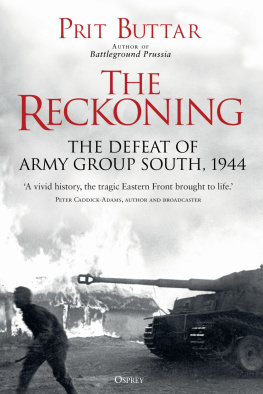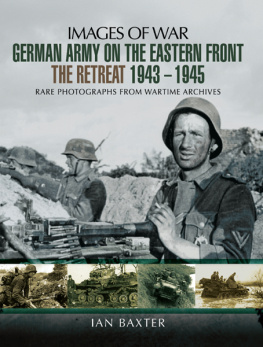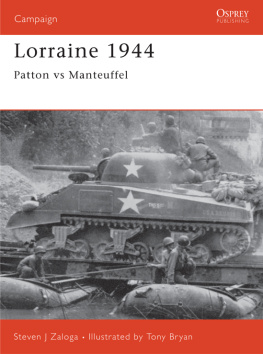Theodore A. Wilson
Jacob W. Kipp
Allan R. Millett
David R. Stone
James H. Willbanks
THE WEHRMACHTS
LAST STAND
German Campaigns of
19441945
Robert M. Citino

UNIVERSITY PRESS OF KANSAS
2017 by the University Press of Kansas
All rights reserved
Published by the University Press of Kansas (Lawrence, Kansas 66045 ), which was organized by the Kansas Board of Regents and is operated and funded by Emporia State University, Fort Hays State University, Kansas State University, Pittsburg State University, the University of Kansas, and Wichita State University.
Library of Congress Cataloging-in-Publication Data
Names: Citino, Robert Michael, 1958 author.
Title: The Wehrmachts last stand : the German campaigns of 1944 1945 / Robert M. Citino.
Description: Lawrence, Kansas : University Press of Kansas, 2017 . | Series: Modern war studies | Includes bibliographical references and index.
Identifiers: LCCN 2017026680 | ISBN 9780700624942 (hardback : alkaline paper) | ISBN 9780700624959 (ebook)
Subjects: LCSH: GermanyArmed ForcesHistoryWorld War, 1939 1945. | World War, 1939 1945CampaignsWestern Front. | World War, 1939 1945CampaignsEastern Front. | GermanyHistory, Militaryth century. | BISAC: HISTORY / Military / World War II. | HISTORY / Military/ General. | HISTORY / Europe / Germany.
Classification: LCC D757 .C597 2017 | DDC 940.54 /21dc23
LC record available at https://lccn.loc.gov/2017026680.
British Library Cataloguing-in-Publication Data is available.
Printed in the United States of America
10
The paper used in this publication is recycled and contains percent postconsumer waste. It is acid free and meets the minimum requirements of the American National Standard for Permanence of Paper for Printed Library Materials Z39.481992.
To Roberta
For Keeping It Real
Contents
Maps
Photographs
FIRST GALLERY
SECOND GALLERY
Writing this book found me in a state of professional transition. I composed it in three places: Carlisle, Pennsylvania, where I was fortunate to serve as the Harold K. Johnson Visiting Professor in Military History and Strategy at the US Army War College; Denton, Texas, where I finished up a seven-year stint on the faculty at the University of North Texas; and finally New Orleans, Louisiana, where I am the Samuel Zemurray Stone Senior Historian at one of Americas greatest educational institutions, The National World War II Museum.
For that reason alone, the number of people who gave me help and support on this project is a large one. In chronological order, Professors Michael Neiberg and William T. Allison were my mainstays at the War College: erudite, hard-nosed about the finer methodological points of scholarship, and wonderful, caring friends. At UNT, I must mention Harold Tanner, China scholar extraordinaire, confidant in trying times, and dear friend, along with brilliant younger colleagues like Sandra Mendiola Garcia, Jennifer Jensen Wallach, Michael Wise, and Christopher Fuhrmann. Here in New Orleans, the former president and CEO of The National World War II Museum, Dr. Gordon Nick Mueller, and his successor, Stephen Watson, have both been more generous to me than words can convey, and I am deeply grateful to them for bringing me to the museum and to this wonderful city.
My work in professional military education has also brought me many worthy colleagues: Colonel Ty Seidule, the head of the History Department at the US Military Academy at West Point, and retired US Army colonels Gian Gentile, currently senior historian at RAND, and Kevin Farrell, the CEO of Battlefield Leadership. All are men of leadership and vision, and I am proud to count them among my friends. Thanks also to General Mark A. Milley, the Chief of Staff of the US Army, for inviting me to address his August 2016 Futures Seminar in Washington, DC. The chief is an avid and omnivorous reader and a sharp thinker, as I discovered during the Q&A!
All through the project, Michael Briggs, formerly the editor-in-chief at the University Press of Kansas, was at my side with advice, encouragement, and the occasional shoulder to cry on. And as the current work comes to fruition, I find myself establishing the same warm relationship with his successor, Joyce Harrison. I know how fortunate I am: I could not have worked with a better press in the course of my career.
I owe a special debt of gratitude to Christian Ankerstjerne, my friend from Denmark, and Seth Paridon of The National World War II Museum, who provided me with expert assistance in assembling the photos for this book. I am fortunate to have so many experts for friends.
Finally, let me turn to the personal side. My wife, Roberta, is a wonderful human being, companion, and adviser. Nothing I do would have meaning if not for her. From Cleveland to New Orleans, with more stops between than I can count, she has been at my side, and once again I know how lucky I am. My daughtersAllison, Laura, and Emilycontinue to delight me with their every word and gesture, and the new additions to our family, Lauras husband, Eric, and Emilys husband, Johan, have only made our Christmas reunions richer and more memorable. I cannot thank all of you enough for your love and support, each and every day.
The Weight of History
Ponder for a moment this dramatic scene from the pages of German history. A long, expensive, and bloody war is nearing its end. Enemy armies are driving on Berlin itself, and life and death seem to hang in the balance:
* * *
berlin . Finally... finally! the leader muttered under his breath. He savored the news that had just arrived in his headquarters. His bitterest and most determined adversary had died after a long and debilitating illness. He knew what that meant: a body blow to the enemy, a wound so grievous that it just might tear apart the coalition he was facing. The news from the fronts had been horrible of late, so bad that he could feel his own fragile health deteriorate with each new dispatch. He couldnt eat or sleep; he trembled. The slightest disruptiona sudden noise, a defeatist comment, a long face among his entourageworked him into a rage that might come on suddenly but took a lot longer to depart.
He knew that the men at the front were still holding out, fighting bravely and to the death. But their ranks were full of teenagers and old men and mercenaries, not to mention wounded soldiers who should still be convalescing in hospital. They were certainly not the men of five or six years ago, when he had started this whole adventure. One bloody campaign after another, especially the last two years of ceaseless combat, had worn them down.
His own generals were useless against such odds. Useless! At best they were orthodox and dull, at worst incompetent andas he now knewdisloyal. They had never believed in him, and that was why defeat was staring them all in the face, why Russian armies were marching on Berlin this very instant. He hated them for their weakness. He hated them all.
If not for him, where would they be? Only his iron will had held them together when nothing else could. He had pulled them through disasters, huge and well-supplied armies coming at them from all directions, a world of enemies howling for their bloodblows that would have broken a lesser will or destroyed a lesser man altogether.








